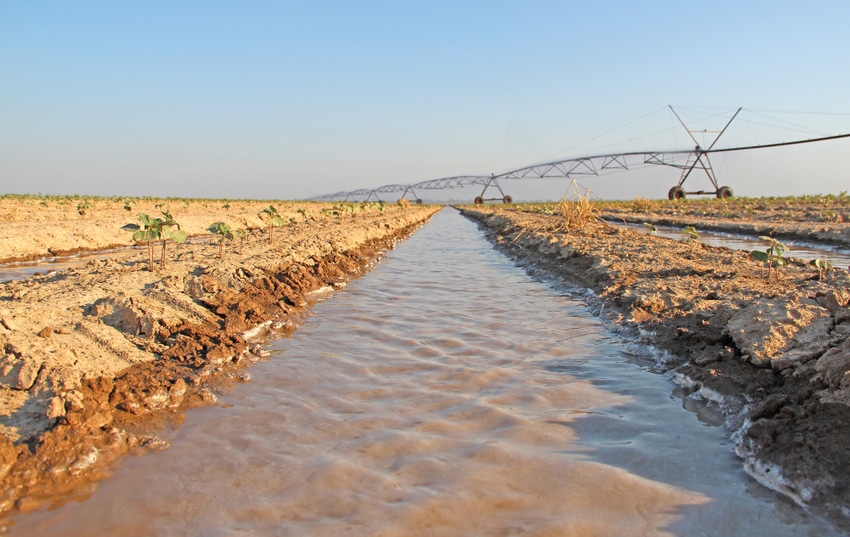March 25, 2014

The Mississippi Soybean Promotion Board (MSPB) launched its Sustainable Irrigation Project, or SIP, 2014 initiative last fall. The objective of the project is to promote the adoption of irrigation practices that will curtail the amount of water that is withdrawn from the Delta alluvial aquifer to irrigate Mississippi crops.
The first two phases of SIP 2014 included the solicitation of a commitment to use water conservation tools on irrigated acres from members of MSPB, the Mississippi Corn Promotion Board, the Mississippi Rice Promotion Board and Rice Council, the Mississippi Farm Bureau Federation (MFBF), the Delta F.A.R.M. Board and commissioners of the Yazoo Mississippi Delta Water Management District.
These tools include PHAUCET and surge valves on furrow-irrigated fields, multiple/side inlet water application to rice, zero grade for flood-irrigated rice and soybeans, tailwater recovery from surface-irrigated fields and center pivot irrigation on 2014 crop acreage.
In February 2014, MSPB and MFBF kicked off Phase Three by sponsoring a series of meetings throughout the Delta to discuss the use of the water conservation tools. These meetings featured Mississippi State University researchers and specialists who presented results from their current irrigation studies and projects that were conducted throughout the state.
More than 550 producers attended these meetings to learn more about the tools and resources available to help them irrigate more efficiently. Attendees were also asked to provide the same information as solicited from members of the above groups.
MSPB is extremely pleased with the results from efforts supporting SIP 2014 thus far. It has received commitments from 142 producers to use one or more conservation tools on over 290,000 irrigated acres. The largest committed acreage, 155,500 acres, is to PHAUCET, which arguably has the greatest potential to significantly reduce the amount of irrigation water applied to Delta crops.
“I’m really excited about the number of acres committed to these conservation tools”, said Jan de Regt, MSPB Chairman. “I can only hope that more farmers will see the monetary and water conservation benefits to be gained from using these tools.”
The committed acres for 2014 represent a great start for the SIP initiative and irrigation water conservation, but with approximately 1.4 million irrigated acres in the Delta, there is room for growth. MSPB encourages farmers who were unable to attend the meetings to start learning about the available water conservation tools and consider how they might benefit their own operation and contribute to the overall water conservation goal. Producers who have not yet adopted or committed to using these tools need to recognize their importance and how they can be used to reduce irrigation water application amounts.
This is especially true for PHAUCET, surge valves, and soil moisture sensors because these technologies will be applicable to the most irrigated acres, and therefore likely will result in the most water savings.
In 2014, MSPB will invest more than $540,000 of Mississippi soybean checkoff dollars in irrigation research and Extension activities conducted by MSU scientists and graduate students. For example, Jason Krutz, MSU-MCES irrigation specialist at the Delta Research and Extension Center in Stoneville, Miss., will continue his MSPB-sponsored RISER (Row Crop Irrigation Science Extension and Research) project, which is being conducted to identify and validate irrigation best management practices and disseminate this information to Mississippi irrigators. Results from this project will be used to further enhance the information provided in the videos An Overview of Irrigation Tools and MSPB-funded Irrigation Results of Krutz’s February 2014 presentations that have been posted on the MSPB website, www.mssoy.org.
Additionally, MSPB is funding projects that are designed to determine the utility and value of on-farm water storage as a source of irrigation water that can replace water pumped from the aquifer. Preliminary results indicate that this is a viable irrigation water option for Mississippi irrigators, but subsequent research will evaluate the economics of this practice.
MSPB plans to sponsor additional SIP 2014 events this summer to give farmers the ability to see irrigation water conservation tools applied in the field. Information about these meetings will be available in the coming weeks.
Producers who want to know more about water conservation tools and their use and keep abreast of future educational and training opportunities about these tools and their adoption, are encouraged to visit the MSPB website, www.mssoy.org/irrigation, or contact Larry Heatherly at [email protected].
You May Also Like




